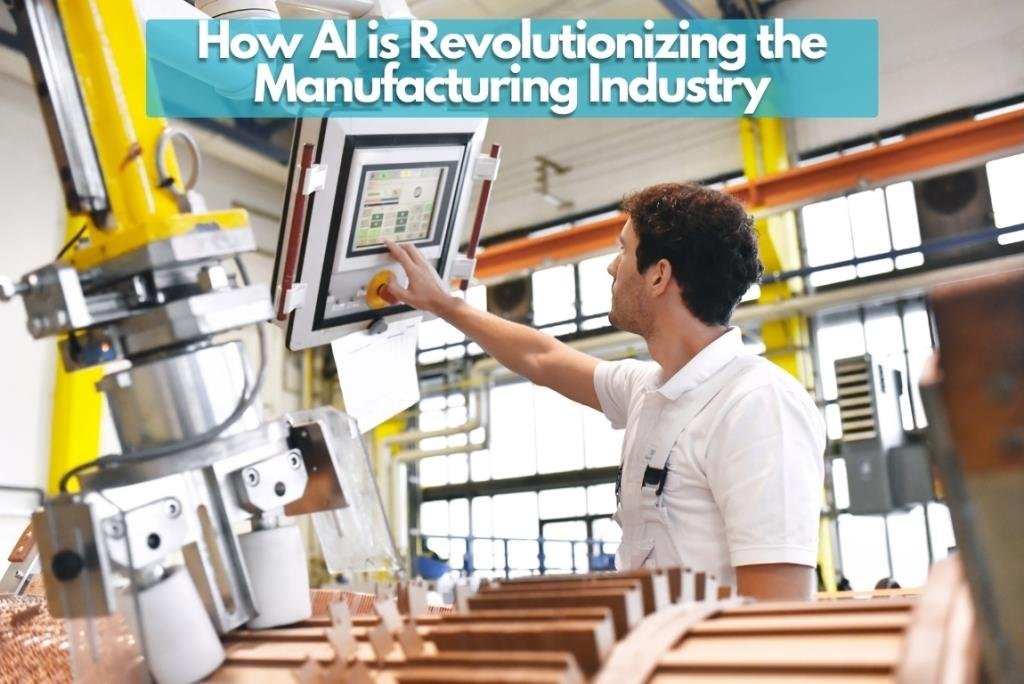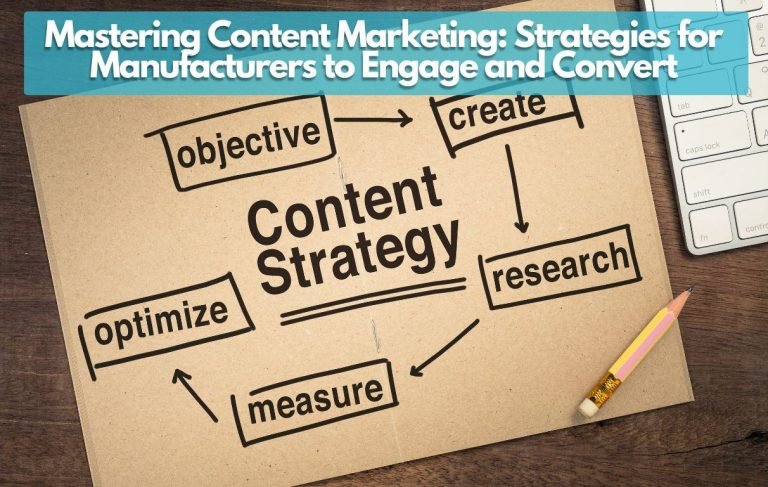How AI is Transforming Manufacturing Dynamics
Traditionally characterized by robust production lines and legacy systems, the manufacturing industry is undergoing a significant transformation. At the heart of this change is Artificial Intelligence (AI), a technology rapidly becoming essential in the sector. In this era of digital innovation, Company, a web marketing business, is collaborating with clients to incorporate AI to enhance their digital marketing visibility and effectiveness, reflecting a broader trend in the industry.
Confronted with challenges like enhancing operational efficiency, reducing product delivery delays, and maintaining competitiveness, manufacturing leaders are turning to AI. This technology offers innovative solutions that are smarter, more efficient, and cost-effective, revolutionizing various aspects of manufacturing, from predictive maintenance to supply chain optimization.
AI in manufacturing is more than an operational tool; it’s a strategic asset driving businesses toward growth and success. Its role in this sector symbolizes keeping pace with technological advancements and steering towards a more innovative and sustainable future.
Enhancing Operational Efficiency with AI in Manufacturing
In manufacturing, operational efficiency is a paramount concern for industry leaders. The integration of Artificial Intelligence (AI) into manufacturing processes marks a significant leap forward in addressing these efficiency concerns. AI’s capability to streamline manufacturing workflows is proving revolutionary, especially in tackling issues that directly impact the bottom line, such as process optimization and product shipping delays.
AI-Driven Process Optimization
AI’s role in process optimization is multifaceted. By analyzing vast amounts of operational data, AI algorithms can identify bottlenecks and inefficiencies that might escape human scrutiny. This analysis leads to more informed decision-making, allowing manufacturers to optimize production schedules, resource allocation, and maintenance routines. The result is a significant reduction in operational costs and an increase in productivity.
Case Studies: AI in Action
Consider the example of a manufacturing plant that implemented AI to manage its inventory. The AI system could accurately predict demand fluctuations and adjust inventory levels accordingly, decreasing overstocking costs and waste. Another case involved using AI in predictive equipment maintenance, where the technology forecasted equipment failures before they occurred, minimizing downtime and maintaining a steady production flow.
Reducing Product Shipping Delays
Shipping delays are a significant concern in manufacturing, directly affecting customer satisfaction and retention. AI assists in this area by optimizing logistics and supply chain management. Through advanced algorithms, AI systems can predict potential delays and provide alternate routing solutions, ensuring timely deliveries and maintaining the integrity of the supply chain. Integrating AI into manufacturing operations is not just about keeping pace with technological trends; it’s about reshaping the foundation of operational efficiency. By harnessing AI’s potential, manufacturing leaders are setting new benchmarks in process optimization and customer satisfaction, ultimately steering their businesses toward greater success and sustainability.
 Driving Business Growth and Market Expansion with AI
Driving Business Growth and Market Expansion with AI
In the competitive manufacturing landscape, business growth and market expansion are critical objectives for industry leaders. Artificial Intelligence (AI) emerges as a crucial ally in this quest, offering innovative ways to increase revenue and explore new market opportunities.
AI and Revenue Growth
AI’s contribution to business growth is multifaceted. AI frees up resources that can be redirected towards growth initiatives by enabling more efficient production processes and reducing operational costs. Additionally, AI-driven analytics provide deep insights into market trends and consumer behaviors, allowing businesses to make data-driven decisions that align with their growth objectives.
Market Analysis and Opportunity Identification
AI excels in analyzing vast amounts of market data to identify untapped opportunities. By leveraging AI, manufacturers can gain a comprehensive understanding of the market dynamics, including customer preferences, competitor strategies, and emerging trends. This level of insight is invaluable in devising strategies for market expansion and identifying new business ventures. AI’s ability to process and analyze data at an unprecedented scale and speed means that manufacturers can stay ahead in a rapidly evolving market. The strategic implementation of AI in manufacturing operations is not just about enhancing current processes; it’s about unlocking new pathways for business growth and market expansion. As the manufacturing industry evolves, AI is a pivotal technology, enabling leaders to transform their business models and achieve their ambitious growth targets.
Improving Brand Promotion and Customer Engagement with AI
Brand promotion and customer engagement are vital for sustaining and growing a business in the competitive manufacturing world. Artificial Intelligence (AI) is increasingly playing a transformative role in these areas, offering innovative ways for manufacturers to enhance their brand presence and deepen customer relationships.
AI in Digital Marketing Strategies
Digital marketing strategies are being revolutionized by AI, enabling manufacturers to reach and engage their target audience more effectively. AI-powered tools can analyze consumer data and online behavior, providing insights that drive more personalized and impactful marketing campaigns. This approach is especially beneficial for manufacturers aiming to strengthen their brand presence and connect with their audience on a deeper level.
Tailoring Customer Experiences Using AI
The ability of AI to tailor customer experiences is a game-changer. By leveraging AI, manufacturers can offer more personalized product recommendations, dynamic content, and interactive customer service. This level of customization in customer interactions enhances the user experience and fosters brand loyalty and advocacy. AI can also play a pivotal role in after-sales service, using predictive analytics to proactively address potential product issues and offer solutions, thereby enhancing customer satisfaction and trust in the brand.
Integrating AI in brand promotion and customer engagement strategies marks a significant advancement for manufacturers. It opens up new avenues for creating meaningful connections with customers and solidifying the brand’s position in the market. As the manufacturing sector evolves, AI is a critical technology in reshaping how brands interact and engage with their customers, driving satisfaction and loyalty.
Adapting to Technological Changes with AI in Manufacturing
The manufacturing industry is at a pivotal juncture where adapting to technological changes is not just an option but a necessity for staying relevant and competitive. Integrating Artificial Intelligence (AI) into existing manufacturing systems presents challenges and opportunities that industry leaders must navigate.
Challenges in AI Integration
Integrating AI into established manufacturing processes can be daunting. It requires a substantial investment in technology and a shift in the workforce’s skill set and mindset. Manufacturers must overcome hurdles such as data siloing, legacy system compatibility, and ensuring cybersecurity. However, the benefits of overcoming these challenges are substantial, including increased efficiency, cost savings, and improved product quality.
Leveraging Opportunities with AI
The opportunities AI presents in manufacturing are vast. It enables predictive maintenance, which can drastically reduce downtime. AI-driven analytics can optimize production processes, leading to higher throughput and better quality control. Moreover, AI can facilitate real-time decision-making, giving manufacturers a significant edge in rapidly responding to market changes and customer demands.
Future Trends in AI for Manufacturing Leaders
Manufacturing leaders should watch for emerging AI trends that could further revolutionize the industry. These include the integration of AI with the Internet of Things (IoT) for enhanced data collection and analysis, using AI in robotics for automated and precise manufacturing, and developing AI-powered supply chain management systems for greater efficiency. Embracing these trends will be crucial for manufacturers to maintain their competitive edge. Adapting to technological changes with AI is a strategic journey for manufacturers. It requires careful planning, investment, and training but promises significant improvements in efficiency, innovation, and market responsiveness. As the manufacturing sector evolves, AI is a cornerstone technology, driving the industry toward a more dynamic and forward-thinking future.
Supply Chain Management with AI in Manufacturing
In today’s fast-paced manufacturing landscape, the efficiency and reliability of the supply chain are crucial for business success. Artificial Intelligence (AI) is becoming vital in revolutionizing supply chain management, offering solutions to optimize operations and mitigate delivery delays.
AI-Driven Efficiency in Supply Chain Management
The application of AI in supply chain management transforms how manufacturers forecast demand, manage inventory, and handle logistics. AI algorithms can analyze complex data sets to predict market trends and consumer demands, enabling manufacturers to optimize inventory levels and reduce overstock or shortages. This predictive capability is essential for maintaining a streamlined supply chain that can respond flexibly to market fluctuations.
Mitigating Delays and Improving Delivery Reliability
One of the most significant advantages of AI in the supply chain is its ability to reduce delays and improve the reliability of deliveries. AI-powered tools can analyze and predict potential bottlenecks and disruptions in the supply chain, from raw material shortages to transportation issues. By anticipating these challenges, manufacturers can proactively adjust their supply chain strategies, ensuring that products are delivered on time and maintain customer satisfaction.
Integrating AI into supply chain management is a game-changer for the manufacturing industry. It enhances operational efficiency and plays a critical role in ensuring timely and reliable deliveries, a key factor in maintaining customer trust and loyalty. As manufacturers face the challenges of a dynamic market, AI stands out as an essential tool for optimizing supply chain operations and driving overall business success.
Conclusion: The Future of Manufacturing with AI
The journey through the manifold ways Artificial Intelligence (AI) is revolutionizing manufacturing has highlighted its pivotal role. From enhancing operational efficiency to optimizing supply chains and ensuring regulatory compliance, AI proves to be more than just a technological advancement; it’s a strategic imperative for industry leaders.
AI’s transformative impact offers a competitive edge in today’s dynamic market, paving the way for innovation, growth, and enhanced customer engagement. For forward-thinking leaders in manufacturing, adopting AI is not a choice but a necessity to stay relevant and lead in the industry.
The message is clear as we look to the future: embracing AI is crucial for manufacturing success. It’s about keeping pace with current trends and shaping the industry’s future. The strategic implementation of AI is an investment that promises to redefine manufacturing, driving it toward efficiency, innovation, and sustained growth. In this context, Company, a web marketing business, is consulting with clients on how to leverage the transformative power of AI in marketing and other business operations to promote a new era of digital and industrial synergy.




